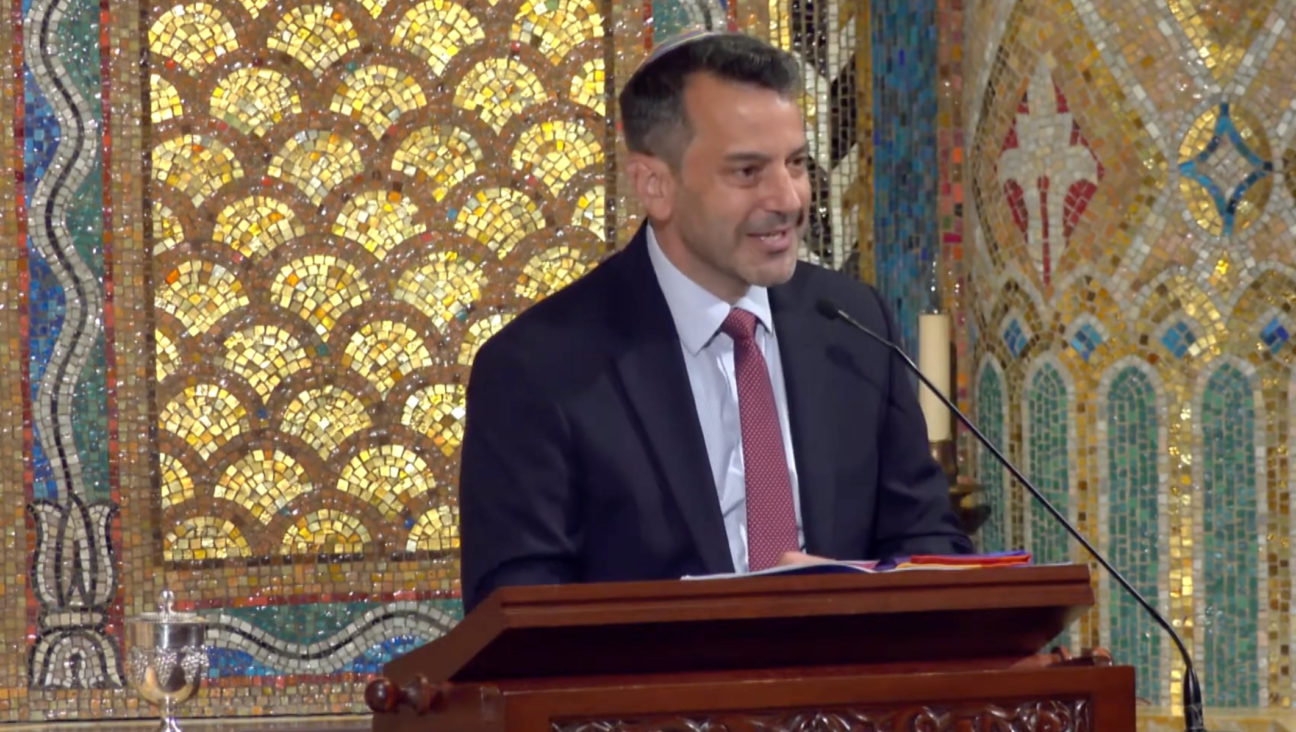A Luxury Seafood Chef Turns Kosher – In The Heart Of Tel Aviv

Chef Yoram Nitzan of NOMI Tel Aviv Image by Nomi Tel Aviv

Image by Nomi Tel Aviv
I have never kept kosher and, to be honest, have no intention of ever doing so. This is not a judgment on anyone’s way of life or a confession of my own shortcomings when it comes to reverence for Scripture — it just means I’m the perfect person to review NOMI, a newly opened kosher restaurant in Tel Aviv’s David Intercontinental Hotel.
Israelis and visitors to Israel have been enjoying a surge in sophisticated establishments that are transforming what many people consider a strict diet, into a cuisine in its own right.
Similar transformations have occurred with vegetarian and vegan cooking, as both meatless and meat and dairy-free dishes are musts for any restaurant that hopes to make it for more than a month. Such transformations challenge the ingenuity and culinary dexterity of any kitchen. In this way, NOMI is emblematic of a trend. But in another way, it’s quite unique.
NOMI’s founding head chef Yoram Nitzan made his reputation at Tel Aviv’s late and much lamented Mul Yam restaurant, which was renowned for…shellfish. First-timers to Mul Yam went prepared to dine off the irony of enjoying shellfish in a country full of Jews, and forgot what was supposed to be so funny when their orders arrived and their senses co-opted by what they went on to remember as one of the finest meals of their life. I know because I was one of them.
So before I reached the end of the email inviting me to sample Chef Nitzam’s new venture, I was dressed and ready to go.
I knew what I would ask him in the forty minutes we had ahead of my meal: Why would a chef known for alchemy with crustaceans agree to preside at a place where shellfish is prohibited? Why would a hotel that appeals to guests who keep kosher, trust him to run the kitchen?
“For twenty years, I cooked lobster. People who loved food but kept kosher heard about my cooking, but couldn’t try it,” Nitzan replies. So for the hotel, it was an opportunity to “give their customers a chance to try my cooking.”
And for Nitzan?
The chef compares the challenge to adapting to cater to vegetarians and vegans. At first, he said — and here I think, something to which a lot of home cooks can relate — “I resented people who had restrictions.” It seemed to him, he said, as if they were rejecting his food. But when he realized that he could make people happy working within their dietary limits, he had a change of heart. “This is what I want to do as a chef. To give people pleasure, to make it possible for people to enjoy my food even if they don’t eat certain things.“
To prepare for his opening, Nitzan made the rounds of such established upscale kosher restaurants as Lumina and Blue Sky in Tel Aviv’s Carlton hotel, where Chef Meir Adoni has been serving meat dishes (at Lumina) and seafood and dairy (at Blue Sky) since 2013; as well as the two restaurants in Jerusalem’s Mamilla Hotel, both opened by Nitzan’s former sous chef at Mul Yam and known globally as culinary destinations, and not only by those committed to kashruth.
Nitzan came away inspired to create a kosher cuisine of his own. Like most Israeli chefs I’ve met, Nitzan prizes the bounty at his disposal, Israel’s abundant and varied produce and its unparalleled freshness and flavor. (If you’ve never eaten in Israel, you’ll suspect that line was scripted by the Ministry of Tourism. If you have eaten in Israel, you will assure your skeptical friends that this is absolutely true.)
And so, to lunch.
It’s a set menu, and we’re supposed to choose one starter and one entrée. No way. Two starters have my name on them and I’m not going to go to my grave wondering what I’ve missed. One is a cauliflower salad with pink tahini. I never went for the ice bucket challenge, but if someone were to come up with something similar that involved dumping tahini on my head, I would be the first to sign up. Blend some fresh beets into it, and I might never emerge.
I can’t say there was a time during our meal when we were conscious of anything missing from the chef’s palette, starting with this salad: sprightly greens (strands of fresh dill, cilantro, mint, arugula and celery) tossed with cauliflower so fresh and grated so fine, it melts on the tongue. This in a pool of said pink tahini that when scooped into the mix, rendered this distinctive melange truly ambrosial.
The next “starter”, a succulent eggplant salad with chickpeas, filaments of roasted orange bell pepper and tahini again (yes!). He’s tossed on sliced radish for texture a nice touch that livens up a dish that might be a bit of a mush without it. Anyone familiar with “sabich”, pita pockets stuffed with fried eggplant, greens and tahini would recognize this as that, but deconstructed. I’m in.
My companion had the minute steak, and I was pleased when he said that it’s delicious. This was news to me. Minute steak was what we ate at the end of the month, when my mother’s food budget had reached its limit and she had to resort to feeding us something more akin to carpet than a cut of meat. In my memories, minute steak is tough and indigestible, not tender and tasty as my companion described.

Image by Nomi Tel Aviv
At this point, any additional eating was strictly recreational for me. I had ordered the sea bass as my main course, which comes simply grilled and seasoned with a relatively classical mix of olives and mushrooms. Again, I didn’t feel as if I were eating in conformity with any restrictive diet.

Image by Nomi Tel Aviv
My companion had ordered the risotto, which Nitzan boasts (sweetly — he’s not given to swagger) as one of his more inspired innovations. How do you make a flavorful risotto without butter? Jerusalem artichoke pureed with vegetable broth, does the trick.
The dessert menu features some eye-snagging numbers, but we agreed we could just about manage to sample the sorbets, three mercifully small scoops of densely concentrated flavor: apricot, coconut and cassis. The plate was garnished with chunks of meringue that had been infused with coconut and made by someone who’s finessed the crispy-to-chewy texture I’ve long stopped trying to master at home.
A brief word about the wines: NOMI showcases Israeli wines as it does the food of the country and a glance at the wine list shows it takes each as seriously as the other.
If NOMI is a bellwether of the future of fine kosher cooking, the outlook for this trend is bright indeed.

Chef Yoram Nitzan at work at NOMI Tel Aviv. Image by Nomi Tel Aviv
Diana Shaw Clark is a writer and activist in Washington, DC. She serves on the Forward Advisory Committee.
A message from our Publisher & CEO Rachel Fishman Feddersen

I hope you appreciated this article. Before you go, I’d like to ask you to please support the Forward’s award-winning, nonprofit journalism so that we can be prepared for whatever news 2025 brings.
At a time when other newsrooms are closing or cutting back, the Forward has removed its paywall and invested additional resources to report on the ground from Israel and around the U.S. on the impact of the war, rising antisemitism and polarized discourse.
Readers like you make it all possible. Support our work by becoming a Forward Member and connect with our journalism and your community.
— Rachel Fishman Feddersen, Publisher and CEO
























